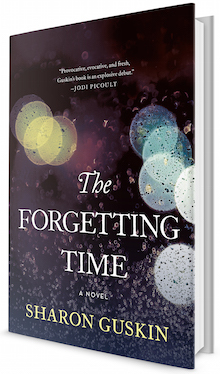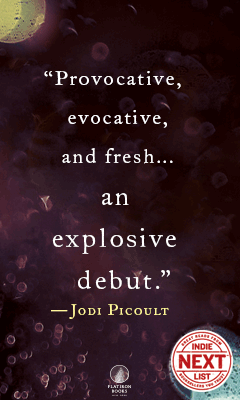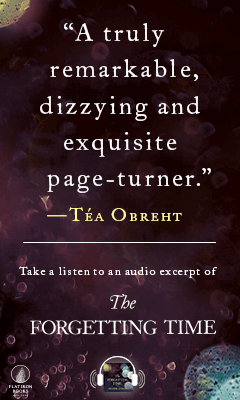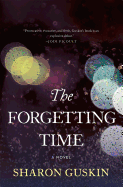The Forgetting Time
by Sharon Guskin
Although reincarnation is a central tenet of several Asian religions, the idea remains the stuff of myth in mainstream Western culture. However, a handful of researchers have documented multiple cases of young children recalling details that seem to come from the lives of deceased strangers, and even meetings between the children and the families of the deceased that take on the qualities of reunions. Science has neither proven nor debunked these cases. Now, first-time novelist Sharon Guskin looks at choices, regret and second chances in the powerful story of a little boy who remembers life as someone else and the adults who struggle to help him find peace.
Although her friends continued to make optimistic remarks about her relationship prospects, Janie gave up on dating at the age of 38 when her mother died. To escape the well-meaning but misguided comments, she decides to spend her 39th birthday on a solo vacation in Trinidad. Over a dish of spicy goat curry, she meets and connects with Jeff, a traveling businessman whose last name she never catches. Because Jeff is married, a brief fling is all they can have. When Janie turns up pregnant, she keeps the baby and considers little Noah a precious gift.
However, Noah grows into a difficult, baffling child. His preschool teachers have always dropped hints to Janie about his hygiene, but when Noah starts talking about playing with guns and having his head held underwater, the school's director threatens to call Child Protective Services. Terrified, Janie confesses the truth, that even she does not understand her child. Noah tells stories about a grandfather he doesn't have, a lake house where they've never been. He cries and begs to go home when they're already there, and he asks, "Is my other mother coming soon?" From a practical standpoint, Noah's overwhelming fear of water poses the greatest challenge, turning bath time into a maelstrom of trauma for son and mother both and leading Janie to put off bathing him as long as possible. Mollified but concerned, the director insists Noah not return to the school until he spends serious time with a therapist.
Janie tries. She takes Noah to therapist after therapist, with results ranging from no answers to a diagnosis of early-onset schizophrenia. Desperate for an explanation that won't involve an antipsychotic prescription for her four-year-old, Janie turns to the Internet. Her research takes a surprising direction, leading her to Dr. Jerome Anderson, an authority on the topic of past-life memories.
Anderson has given his professional life over to researching the phenomenon of past-life memories in children, subjecting himself to the mockery of his peers. He has just received a death sentence not only for his body, but for his mind: he has primary progressive aphasia, a degenerative condition that affects the brain's language center and causes its victims to lose the ability to speak, read and write. Anderson may live another 10 years, but he will only be able to care for himself for another six or seven, and he has already begun losing words. When his editor calls and offers to turn his research into a book, Anderson sees a last chance at preserving his legacy, but it comes with the condition that he find an airtight, recent case from America. Most of his research comes from Thailand and India, countries whose people accept reincarnation as possible, and American cases are tough to find. Then Janie calls.
Meanwhile, thousands of miles away, a mother has spent years grieving her missing child while a killer walks free.
Whether or not the reader believes in life after death, Guskin offers an intimate and suspenseful portrait of a family in crisis and a man struggling to take control of what little life remains to him. Janie's conflict centers around a universal parenting dilemma: How can she do what is best for her child when she must choose between impossible options, either of which could harm him? As a single mother with no system for support, Janie can call the shots but also knows she carries full responsibility for the outcome. Her partnership with Anderson is fraught with distrust as she dismisses his theories but remains unable to find a better explanation for Noah's behavior. For his part, Anderson grapples with his desire to create a lasting legacy, and hides his condition from Janie, knowing deep down that he may have taken the case for the wrong reasons.
Intercut with excerpted case studies from actual past-life researcher Dr. Jim Tucker's Life Before Life: Children's Memories of Previous Lives, Guskin's drama is honest, even comforting, but never gimmicky. She challenges readers to dream beyond conventional boundaries and consider that human consciousness may be more complicated and far-reaching than science or Western religion believe. At the same time, her grasp of the beauty and ferocity of a mother's love grounds the story in a frame anyone can accept. The complex but graceful knitting together of the story's loose ends will give the reader a sense of balance and lightness that comes from remembering how many unexplained wonders the universe has in store for all of us. --Jaclyn Fulwood








_David_Jacobs_(Medium).jpg)